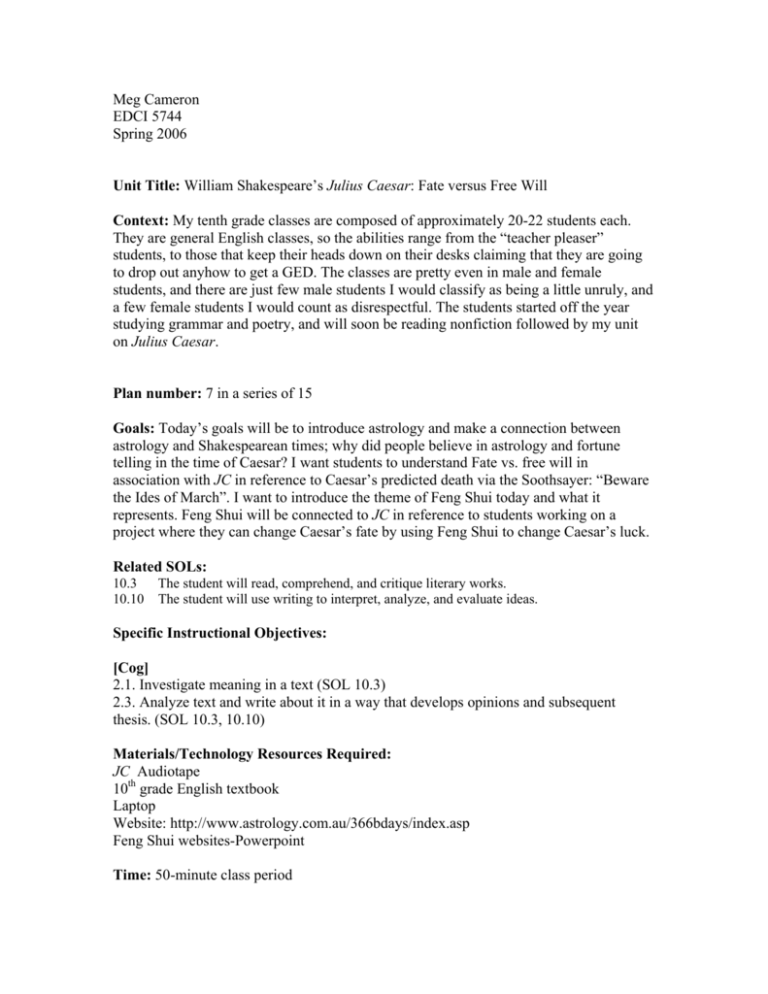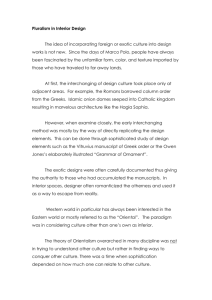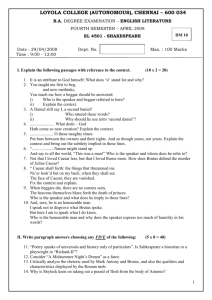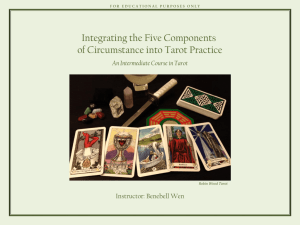William Shakespeare's Julius Caesar: Fate versus
advertisement

Meg Cameron EDCI 5744 Spring 2006 Unit Title: William Shakespeare’s Julius Caesar: Fate versus Free Will Context: My tenth grade classes are composed of approximately 20-22 students each. They are general English classes, so the abilities range from the “teacher pleaser” students, to those that keep their heads down on their desks claiming that they are going to drop out anyhow to get a GED. The classes are pretty even in male and female students, and there are just few male students I would classify as being a little unruly, and a few female students I would count as disrespectful. The students started off the year studying grammar and poetry, and will soon be reading nonfiction followed by my unit on Julius Caesar. Plan number: 7 in a series of 15 Goals: Today’s goals will be to introduce astrology and make a connection between astrology and Shakespearean times; why did people believe in astrology and fortune telling in the time of Caesar? I want students to understand Fate vs. free will in association with JC in reference to Caesar’s predicted death via the Soothsayer: “Beware the Ides of March”. I want to introduce the theme of Feng Shui today and what it represents. Feng Shui will be connected to JC in reference to students working on a project where they can change Caesar’s fate by using Feng Shui to change Caesar’s luck. Related SOLs: 10.3 10.10 The student will read, comprehend, and critique literary works. The student will use writing to interpret, analyze, and evaluate ideas. Specific Instructional Objectives: [Cog] 2.1. Investigate meaning in a text (SOL 10.3) 2.3. Analyze text and write about it in a way that develops opinions and subsequent thesis. (SOL 10.3, 10.10) Materials/Technology Resources Required: JC Audiotape 10th grade English textbook Laptop Website: http://www.astrology.com.au/366bdays/index.asp Feng Shui websites-Powerpoint Time: 50-minute class period Procedures/Steps: 1) 10 minutes-Bridge After students are in seats, I ask for a volunteer to give me their birth date. I enter it, and a horoscope, or profile for their personality comes up. I enter my birth date and Paiges’, and we as a class read and try to analyze it. I ask them how they think astrology ties in with the themes of fate and free will. Target Answers: If people really believe in astrology, then they might believe their fate is already sealed, and they have no choice or decision in their future. If they believe in free will, then they recognize their astrological reading as a “heads up” to their future; they can see the future through their horoscope, and now they have the option of changing it. Transition Students are asked to pay particular attention to the soothsayer in today’s reading. What is he saying to Caesar? How is the prophecy from the soothsayer affecting Caesar’s fate? Free Will? Students are asked to think about Caesar’s choices in association with the Soothsayer’s prophecy. 2) 20 minutes Students are asked to open their textbooks and turn to where we left off in JC. We will spend approximately 20 minutes listening to the play being read out loud. JC Context: Act I, Scene ii Caesar meets the soothsayer and ignores his warning. Cassius and Brutus start to discuss their plan to undermine Caesar. Here we see Cassius’s “underlings” quote. Cassius forges letters to Brutus, convincing Brutus he that he should be leader, not Caesar. 3) 15 minutes Students are asked what they thought about yesterday’s Dr. Phil segment and how they responded in their homework to the questions asked. Students are asked to share: What was Cassius saying in his quote? How would he approach aging? Target Answers: That we choose to be who we are, that we can choose to be leaders, or choose to be “underlings”. Aging can be changed or prevented, or variations of this answer. What was Caesar saying in his quote? How would he approach aging? Target Answers: That death will come when it comes; there is no use in fearing it or try to avoid it. Aging cannot be avoided, like death, it is the inevitable, and variations of this answer. Transition Students are asked what they know about Feng Shui. I give them a simple definition, and students are asked how they think this definition: would apply to the themes of fate and free will. We define further what Feng Shui is through a powerpoint I made up in order to explain Feng Shui, and how it, like the general definition for astrology, relates to the theme of fate versus free will. 4) 5 minutes- Transition/Conclusion Students are asked to take out a piece of paper to use as an “exit slip”. The question they are to answer is: “What did they think Feng Shui was before they came to class? Now what do they think it is?” I inform students that tomorrow, using the information on Feng Shui, and their theories on fate and free will, they are going to change the course of history. Students are informed that this Friday, we will be having a small quiz on JC Act I. After I tell them this, I write this “reminder” on the whiteboard, so students can be reminded each day, and I can remember to point it out all the days until Friday. Evaluation Students will be evaluated based on their exit slips, homework responses, and participation and attention in class. Accommodations/ Differentiation Students will be supplied with the web addresses in order to look at the websites on their own time. In Retrospect/In Reflection Appendix of Materials Required Laptop Sites for astrology and Feng Shui Powerpoint presentation Works Cited Dadhichi. Birthday horoscope. 366 Birthday Profiles. Retrieved January 5, 2006 from the World Wide Web: http://www.astrology.com.au/366bdays/index.asp. DeSpirit, Debbie. About Feng Shui. Your Guide to Feng Shui. Retrieved February 20, 2006 from the World Wide Web: http://fengshui.about.com/ Drama Soundbook Recording. (1964). William Shakespeare: Julius Caesar: Complete Play in Five Acts. New York: Caedmon. Prentice-Hall, Inc. (2000). Prentice Hall Literature: Timeless Voices, Timeless Themes. New Jersey: Author.






